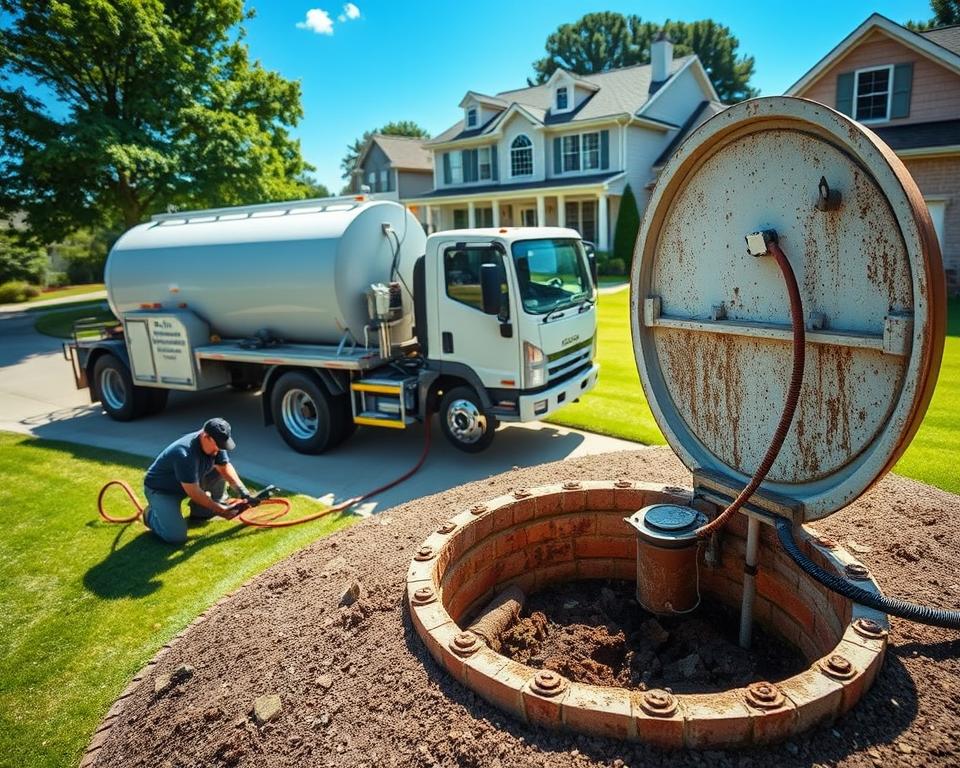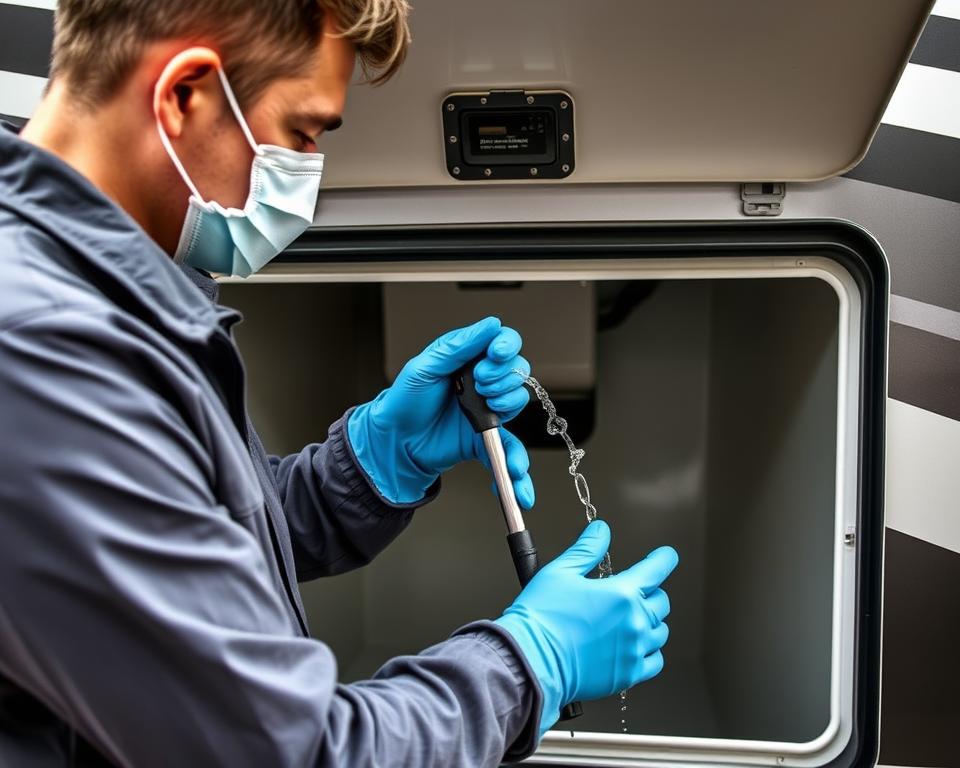How to Evaluate Septic Pumping Companies Near Me in Glendale
Specialist Septic Tank Maintenance Service In Your Area
Have you considered how a Septic unit in excellent order shields your home and health? It’s crucial to grasp the necessity of professional Septic tank care. Many homeowners disregard their Septic system’s health until problems arise. “All in Sanitation” provides reliable Septic cleaning to avoid such difficulties. They emphasize customer contentment and efficient operation. This secures your Septic system functions without a hitch. Let’s examine the need of Septic tank maintenance for your home and expectations from a credible Septic tank Pumping firm.
Key Highlights
- Regular Septic tank maintenance is vital for residential protection.
- Selecting a reliable Septic cleaning service promotes optimal performance.
- All in Sanitation is a respected name in Septic tank maintenance.
- Being aware of how it works during a cleaning can reduce anxiety.
- Timely maintenance can prevent pricey restorations in the coming years.
Why Septic System Maintenance Matters
Regular upkeep of your Septic system is vital for its performance – septic service near me. It secures trouble-free running and wards off significant complications from lack of care. Every household’s effluent volume is individual, and it’s important to accommodate these specifics for peak management.
The capacity of your household and the amount of wastewater and solids produced influence your system’s performance. Without appropriate maintenance, blockages can form, leading to pricey repairs and health hazards. Sewage tank Pumping is paramount, as it removes waste that could lead to serious issues over time.
Caring for your Septic system boosts its lifespan and capability. Regular check-ups forestall the pricey fallout of system failure. By investing in upkeep, you provide your home retains a reliable and well-functioning sanitation system.
What Septic Tank Cleaning Involves
Septic tank cleaning services maintain wastewater systems operate efficiently and last longer. They include evacuating waste and washing interior walls, which stops clogs and forestalls system failures. Both household and business Septic systems require consistent maintenance.
For homes, household cleaning meets the distinct needs of families. It incorporates routine Pumping and comprehensive assessments. These actions get rid of unpleasant scents and head off costly repairs. Enterprise cleaning enables organizations comply with regulatory requirements. It’s essential for smooth operations in places like restaurants and hotels, limiting shutdowns.
Professionals execute these sanitation operations with efficiency. They share insights suited to your system’s needs. This bespoke care helps both home and business owners. Scheduled care not only protects the environment but also prolongs longevity.
| Service Type | Key Features | Benefits |
|---|---|---|
| Residential Septic Cleaning | Pumping solids, sludge removal, system inspections | Optimizes system functionality, avoids odors, reduces repair costs |
| Commercial Septic Cleaning | Regular maintenance, compliance checks, emergency services | Supports business operations, maintains regulatory compliance, minimizes downtime |
Septic Tank Cleaning Schedule
Identifying when to service your Septic tank is crucial for homeowners. You might see signs like delayed draining and unpleasant scents. Also, water collecting around the leach field and very green grass in spots are signals. These signs indicate the system is at capacity and demands maintenance.
Adhering to a Septic tank service calendar is vital for smooth operation. The EPA recommends a service every 3 to 5 years. But this varies with the number of your household and usage levels. Big households or increased demand might require yearly cleaning. Keeping tabs on these factors can protect your setup and your wallet from huge expenses.

| Signs of a Full Septic Tank | Recommended Action |
|---|---|
| Slow draining sinks and toilets | Schedule prompt Septic tank service |
| Sewage odors indoors or outdoors | Assess and clean the Septic tank |
| Pooling water in the yard | Inspect the Septic system; schedule cleaning if necessary |
| Overly green grass over the drain field | Consider a Septic tank cleaning |
Being proactive by monitoring these indicators can protect your home and its Septic system.
Picking the Best Septic Tank Cleaner
Finding a dependable Septic tank cleaning service can be difficult. However, a well-considered decision can deliver a seamless experience. Begin by confirming that the company has the necessary certifications. Also, review its status within your region. Digital feedback can supply insights, revealing the service’s strengths and drawbacks.
It’s helpful to collect quotes from multiple services. The fee can differ, based on the services they provide. Compare what’s offered in each quote, especially the machinery and procedures used. Opting for a service that uses up-to-date machinery can lead to enhanced effectiveness.
Putting forward candidate companies the following questions can reveal their credibility:
- How long have you been in the Septic tank sanitation business?
- Can you share testimonials from previous customers?
- What procedures do you use?
- Do you back any assurances for your operations?
Opting smartly can help maintain your Septic system properly, reducing high repair bills in the future.
| Criteria | Importance | Considerations |
|---|---|---|
| Certification | High | Validates competency and compliance with regulations |
| Reputation | High | Reflects past customer satisfaction and service quality |
| Equipment | Medium | Quality tools improve cleaning effectiveness |
| Pricing | Medium | Ensure value for services provided |
Inside a Professional Septic Clean
Homeowners often ask about the particulars of qualified Septic service. Knowing the workflow can ease worries and prepare you for cleaning day.
An opening system evaluation is the first step. A trained technician examines capacity, state, and any unique concerns. This assessment establishes the basis for the cleaning method.
Then, the Pumping gets underway. Using high-powered tools, the technician evacuates sludge and wastewater. This step typically requires around sixty minutes, based on tank size and condition. Proper equipment use is crucial for system protection.
Following extraction, a detailed cleaning ensues. The technician reviews baffles and elements for good working order. Brief smells may appear at this point, which is typical. Technicians tackle these odors with skill.
In essence, a expert Septic clean improves system performance. Grasping the procedure explains the experience, cutting homeowner stress.
What Affects Septic Cleaning Costs
Grasping Septic tank maintenance fees entails assessing various factors that affect overall pricing. The dimension is critical, as greater capacities call for more effort and time for cleaning. Additionally, the tank’s condition plays a large factor in determining costs. A regularly cleaned tank may need less extensive work, whereas a overlooked one might call for additional work, leading to higher charges.
| Service Type | Average Cost |
|---|---|
| Septic Tank Pumping | $200 – $450 |
| Comprehensive Cleaning | $300 – $600 |
| Inspection Fee | $100 – $200 |
| Maintenance Plan | $150 – $300 annually |
By reviewing these factors, homeowners can handle Septic tank service pricing more efficiently and select services that meet their specific needs.
Emergency Septic Services: When You Need Help Fast
Handling Septic system problems can be challenging. Recognizing the benefit of urgent assistance is essential in such times. Homeowners should recognize signs like system back-ups, bad smells, or slow drains, signaling a need for urgent Septic cleaning.
It’s imperative to act quickly to avoid severe damage, higher bills, and health threats. Companies such as All in Sanitation ensure speedy replies. This urgency tackles your critical needs before they get worse.
Emergency Septic services are prepared for various cases, including:
- Septic tank overflows
- Backing up systems
- Severe clogs in plumbing
Prompt action is necessary for these situations to avoid further complications. Engaging a dependable service secures experienced experts will efficiently handle your problem.
Speedy help doesn’t just correct the current crisis. It also gives confidence that your Septic system is in competent care. Recognizing when to request emergency Septic services can free you from trouble and greater charges.
All in Sanitation: Key Benefits
Opting for All in Sanitation’s experience in Septic services provides obvious perks for Septic tank servicing. Their adept technicians utilize advanced tools for thorough and efficient service. This practice exceeds traditional methods, prioritizing client approval and upholding high benchmarks.
All in Sanitation offers affordable solutions customized for specific needs. This comprises scheduled maintenance and inspections to head off potential troubles. The presence of emergency services ensures swift resolution of sudden problems, offering homeowners confidence.
- Experienced Technicians: Personnel are thoroughly trained and versed about Septic systems.
- Modern Equipment: Up-to-date machinery deliver a efficient service.
- Commitment to Satisfaction: Customer feedback influences the quality of service delivered.
- Comprehensive Services: From inspections to emergency help, everything is included in one place.
- Competitive Pricing: Provides great value without compromising service quality.
Opting for All in Sanitation means a range of advantages from expert care. This encourages a soundly maintained system, boosting everyday life quality.
The Final Word
Regular Septic tank service is necessary for your system’s extended lifespan and performance. Using a professional Septic tank local cleaning firm means specialists will monitor and resolve issues promptly. This reduces the risk of pricey restorations later.
Knowing the proper care calendar and opting for the right service are crucial for your system. Qualified firms, like All in Sanitation, offer timely, bespoke care.
Preserving your Septic system sound secures your family’s reassurance. Professional and prompt attention avoids sudden problems. Make a move now to defend your home and the environment with a reliable Septic tank service partner.

